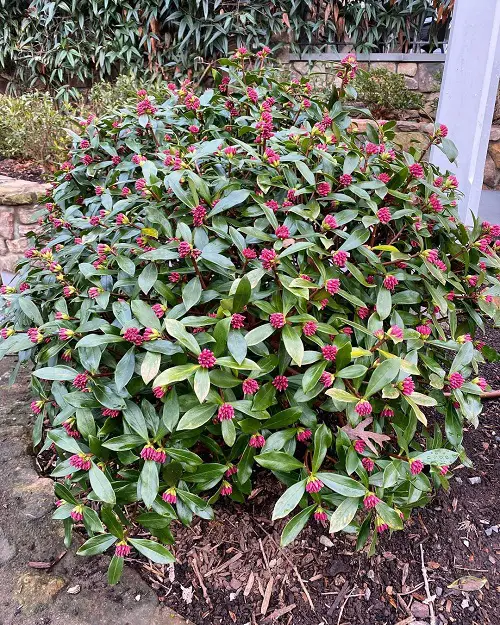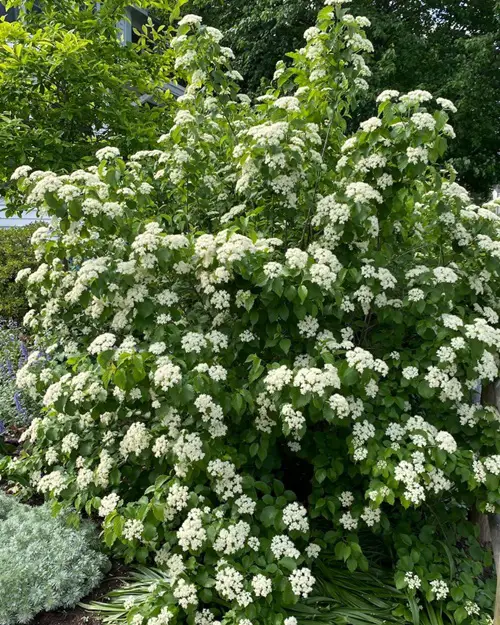If you love scented plants around you but miss their presence when colder weather arrives, grow these fragrant winter plants!
Winter can feel a bit lifeless, doesn’t it? Most plants take a break from blooming, leaving gardens looking dull and gloomy. But, with these fragrant winter plants, you can still enjoy the scent and beauty even when it’s cold outside. Let’s explore some aromatic delights that thrive even when temperatures drop.
Best Plants for Winter Fragrant Gardens
1. Winter Daphne
Botanical Name: Daphne odora
USDA Zones: 7-9
Winter Daphne is an evergreen shrub particularly desired for its fragrant, pale pink to white flowers and dark green glossy leaves. It is from Southern China, Vietnam, and Taiwan blooming in tight clusters from the mid-to-late winter season.
Daphne odora can handle temperatures as low as 10°F (-12°C), so it is well-suited for colder climates.
Later, these blossoms develop into red or black fruits, marking the beginning of a new generation. It’s an excellent choice for growing near entryways, walkways, or as a foundation plant.
Caution: This plant is highly toxic to pets and children. It causes skin irritation if you are allergic to its phytoconstituents found in the bark, flowers, or leaves.
2. Sweet Box
Botanical Name: Sarcococca confusa
USDA Zones: 6-9
Do you love the sweet scent of vanilla? Then, this broad-leaved everlasting shrub will be the best option for your lovely, fragrant winter garden.
Sweetbox shrubs can grow up to 3-5 feet tall, with upright stems arching along with tiny creamy-white flowers that release a trail of delightful vanilla fragrance.
Plant them in a shaded location with moist and well-drained soil to keep these beauties thriving. You can also grow them in containers, as they are perfect for both indoors and outdoors!
3. Chinese Paperbush
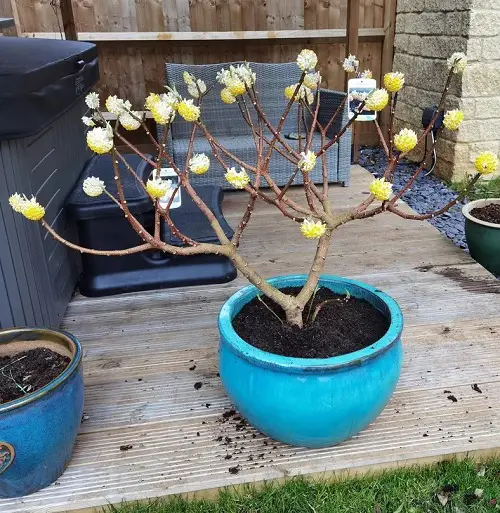
Botanical Name: Edgeworthia chrysantha
USDA Zones: 7-10
The most fragrant plant on this list is the Chinese paperbush, which also has very attractive flowers. This deciduous shrub reaches a height of up to 6 feet and has flowers that bloom around December on bare stems even when temperatures dip as minimum as 5°F (-15°C). The bright flowers have a heady gardenia-like scent.
While the blooms are tiny, they form large clusters. It grows well in partial shade and likes organically enriched soil. You can even cut some flowering stems for indoor vases to enjoy its fragrance indoors.
4. Viburnum
Botanical Name: Sarcococca confusa
USDA Zones: 5-8
Viburnums are deciduous shrubs that can grow up to 10 feet tall, showcasing dark green leaves that emerge with a bronze tint in their juvenile stage. These shrubs are widely popular and desired for their richly scented, dark pink to white tubular flowers, produced in compact clusters from the autumn to spring seasons.
To enjoy the rich fragrance of Viburnums in your garden, plant them in humus-rich, moist soil with proper drainage and in sunny or partly shaded areas, preferably in west-facing or east-facing spots.
Caution: The fruits of this plant are potentially harmful to pets and children if ingested.
5. Wintersweet
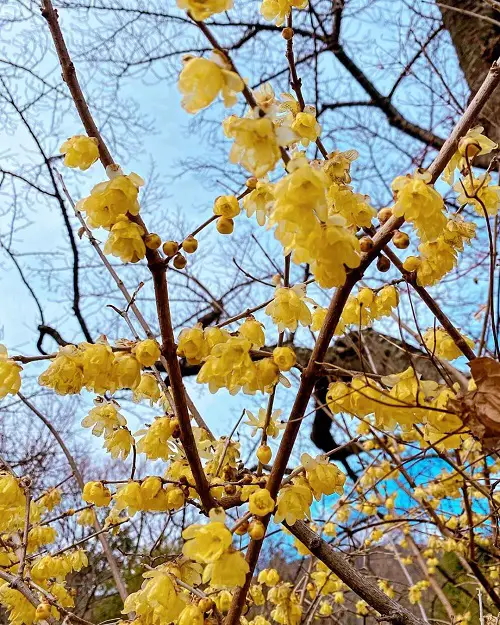
Botanical Name: Chimonanthus praecox
USDA Zones: 7-9
Wintersweet is a fragrant deciduous shrub that features tender, translucent flowers in pale yellow colors with maroon centers during the winter and spring seasons.
It is such a low-maintenance plant that can grow in a variety of soil conditions as long as it is moist and well-drained.
The aroma of its blooms leaves a trail of powerful yet sweet and spicy scent that lingers throughout the active booming period. Besides, it requires a bright sunny spot and can endure long hours of sunlight to grow tall and give some height to one’s garden!
6. Christmas Rose
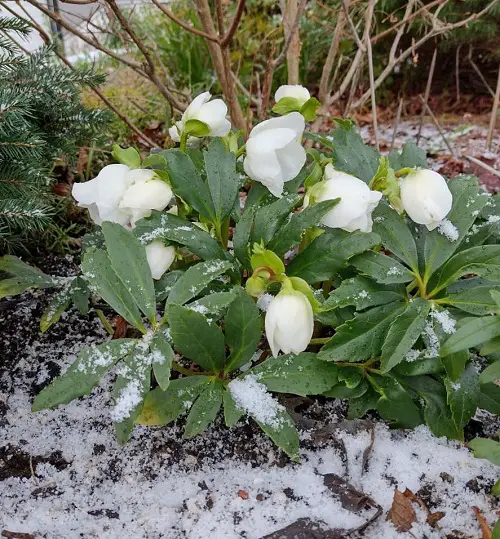
Botanical Name: Helleborus niger
USDA Zones: 4-9
A hardy perennial plant that produces long-lasting winter blooms and, depending on its varieties, releases a range of subtle sweet aromas. These flowers come in shades of white, pink and green.
Christmas roses hail from the limestone regions of Europe, and they grow best in deep, fertile soils that are slightly alkaline and remain moist. You can add some ground limestone during soil preparation to mimic the condition of its natural habitat!
Fun fact: It has been popular as a medicinal plant from medieval times to the Victorian era for its ability to purge the human body and also kill intestinal worms.
7. Winter Hazel
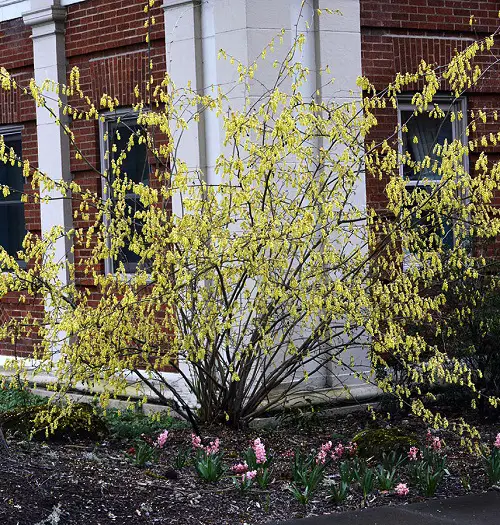
Botanical Name: Corylopsis spicata
USDA Zones: 6-9
Corylopsis is a genus of almost 30 species of flowering plants that again offer a variety of fragrances depending on the species. These plants are generally shrubs that reach 4-6 feet tall and wide with small clusters of bright yellow blossoms from February to March. Despite its delicate appearance, it can endure temperatures as low as 10°F (-12°C).
The showy flowers are mostly planted along the sidewalks or entrances because the strong, mesmerizing fragrances uplift the mood of every passerby!
Tips for a Winter Fragrant Garden
1. Choose the Right Spot
Pick locations with ample sunlight or shade, depending on the species you choose to grow. For fragrant plants like Daphne, you can place them near entryways or walkways to enjoy their scent daily.
Meanwhile, avoid planting them too close to large structures that block the light and airflow. You may also plan out on grouping plants with similar care needs to simplify the maintenance routine.
2. Soil and Drainage
Always confirm the soil is rich in organic matter by adding compost or well-rotted manure because most winter-fragrant plants thrive in rich soil. Along with this also maintain the drainage of the soil to avoid waterlogging.
Mix sand or perlite for a better drainage system in heavy clay soil. Then mulch around the plants to retain the moisture and protect them from winter frost as well!
3. Protect from Harsh Weather
Use frost clothes or row covers to shield the plants from the extreme cold and snow. Also, apply mulch, straw, and dried leaves to layer around the base of shrubs to insulate roots.
If there are potted plants, then move them to sheltered areas or indoors during frosty nights.
So, why not bring these aromatic delights into your garden this winter? We’re excited to hear about your experiences! Which of these fragrant plants do you already grow, or are you planning to add? Share your thoughts and tips in the comments below!


